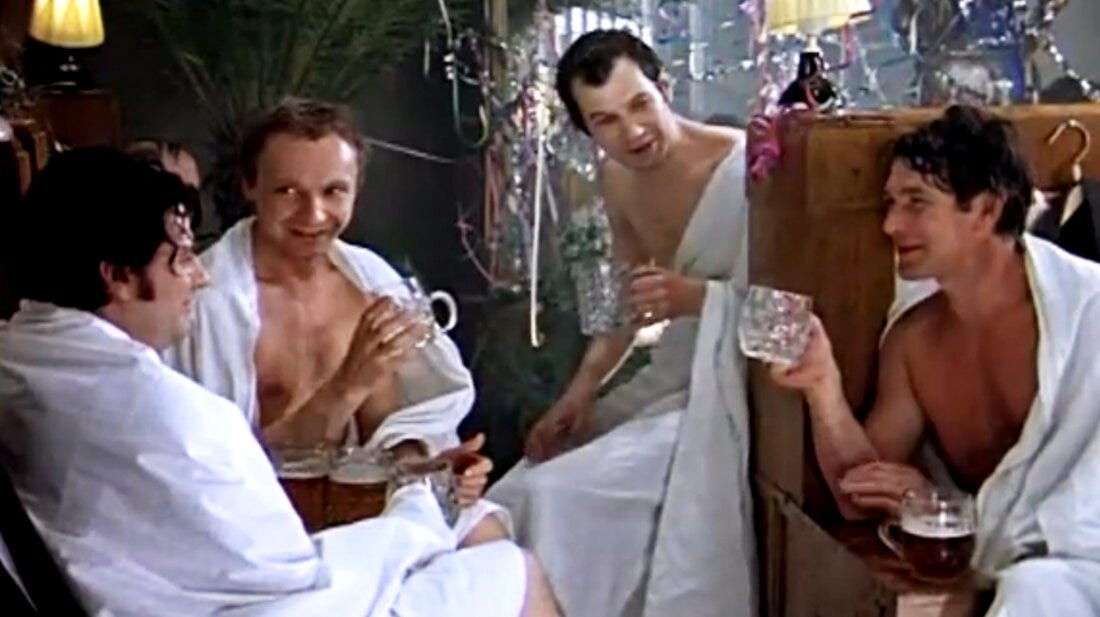As always, if I know you IRL and you want to evade the paywall, just reach out on any platform and I will comp your subscription!
Content warning: homophobia.
--
A few days ago, some friends in Philly and I went to the banya. As a post-Soviet nostalgic, I have taken it upon myself to go to the banya around New Year’s every year since 2013. It’s a fantastic cleansing ritual: what better than the Russian bathhouse to wipe away the horrors of the last year? But for us post-Soviets, there is also an association between NYE and the banya, thanks to a film called The Irony of Fate, or Enjoy Your Bath (Ryazanov, 1975; literally Enjoy Your Bath is “with light steam,” a phrase which Russophones exclaim whenever anyone returns from bathing). This is a delightful 3+ hour musical-comedy-melodrama about a Muscovite man who goes to the banya with his friends on NYE, gets plastered, and ends up on a flight to Leningrad. (A substantial part of the film is also criticism about generic Soviet architectural styles during Khrushchev and Brezhnev, since he has no idea he’s in Leningrad.) The film continues to be massively popular, and is played every New Year’s in Russophone TV stations around the world.
So, as per tradition, my non-Russophone Philly friends and I went to the banya in Southampton, PA, a suburb in the northeast that is known for its Eastern European and Central Asian population. I’ve been going to this banya several times a year, and have seen its clientele slowly evolve from primarily Russophone families and the typical Eastern European bro to young queer millennial and Gen Z folks. Each visit, the proportion of pierced, tattooed, strangely hair’d millennials like myself increased, although there was what my friends and I call a “changing of the guards” around dinnertime, when “the bros” would arrive, fresh and sweaty from some kind of sport practice, gear in tow, crowding the saunas and generally not giving anyone a minute of peace. To the banya staff’s credit, they treat everyone with the same general pragmatic post-Soviet neutrality, and do not prioritize one or other clientele.
This particular time, my friends and I happened to leave precisely at the same time that the bros arrived. I had just showered so my blue hair was especially visible. I had a vintage Tommy Hilfiger bomber jacket with a giant rainbow on the back. I wasn’t wearing makeup. I clearly looked very queer— something that the meatheads started commenting about in Russian, which they clearly believed I didn’t understand. As I was checking out at the front desk, surrounded by around 15 burly men at least a foot taller than me, I heard some variation of:
“Look at these freaks”
“Yeah I’ve been seeing them more and more, I saw them hanging around here last time, too”
“What weirdos”
“What can we do, eh? This is America” (laughter)
Now, as far as homophobia goes, I’ve certainly heard worse. And certainly my friends and I have made fun of the bros behind closed doors as well: glass houses, etc. But something about the blatant obviousness of it all, at the checkout desk, with my two friends nearby, made my blood boil. (Was this, I wondered, how we get hate crime’d?) I made a point to thank the checkout woman in Russian, for once with a perfect accent (historically, anger has always been a Russian emotion for me, anyway; I can be angry in Russian, but English remains rational, distanced, intellectual). I stared at the bros’ faces with all the malice I could muster and watched their expressions stay exactly the same. They didn’t care. Why would they? But they probably didn’t expect the “blue haired weirdo” to be “one of theirs,” iz nashich, as my mother would say.
WEB Du Bois coined the term “double-consciousness” to describe the specific feeling of inward putative “twoness” in Black people, a consciousness on once side authentic to one’s own culture and experience, and on another, the internalized racist ideology of a white supremacist society. Occasionally it is also used to refer to people of diasporic and immigrant backgrounds. I feel some discomfort using the term for my own experience— while a refugee, I certainly experience most of the privileges of whiteness. Yet I think the term can be applied outside of an explicit colonial context (or if not, I would love to learn of a word that I can use for this particular situation, a kind of internalized carcerality).



